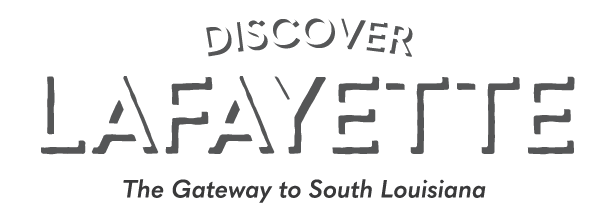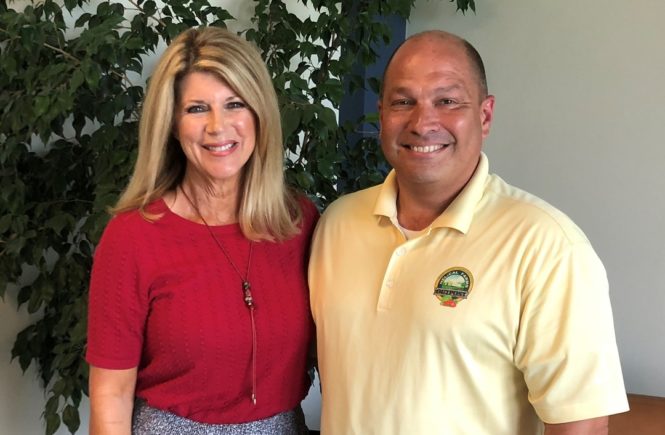Podcast: Play in new window | Download (Duration: 54:58 — 75.5MB)
Imagine farming without needing hundreds of acres or having to get your hands dirty in the soil. How about saving up to 90% of the water needed in conventional agriculture to successfully produce a high-yield, high-margin crop, and possibly serving as a catalyst for our next generation to explore a career in sustainable farming? Our guest on this episode of Discover Lafayette, Kohlie Frantzen, founder and managing partner of Helical Outposts, discusses all of this, and much more.
Kohlie Frantzen is a certified hydroponicist engaged in hydroponic farming, which is done in a controlled environment protected from the elements and doesn’t need soil to grow produce. You can grow the equivalent of 3 acres of crops in a space as small as 3000 square feet. Picture a large storage container with a big greenhouse (pod) next to it that can fit in a small postage stamp of real estate.
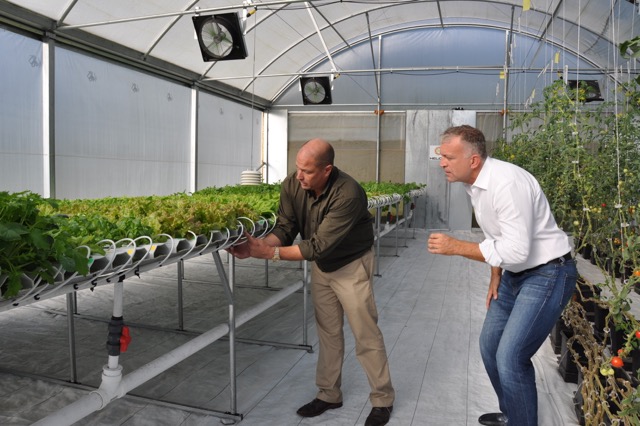
Kohlie Frantzen and his partner at Helical Outposts, Dylan Ratigan 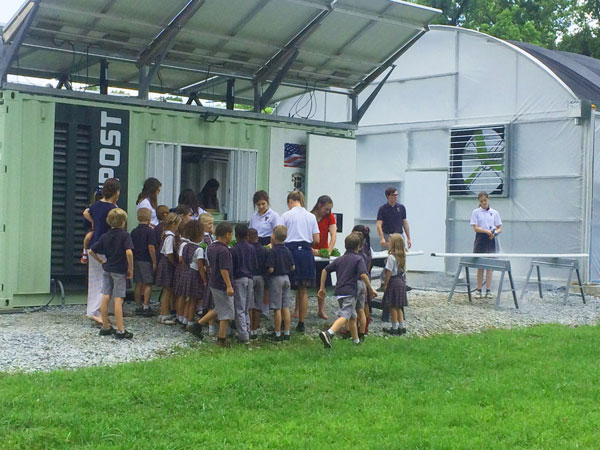
Students at John Paul the Great Academy engaged in hydroponic farming. 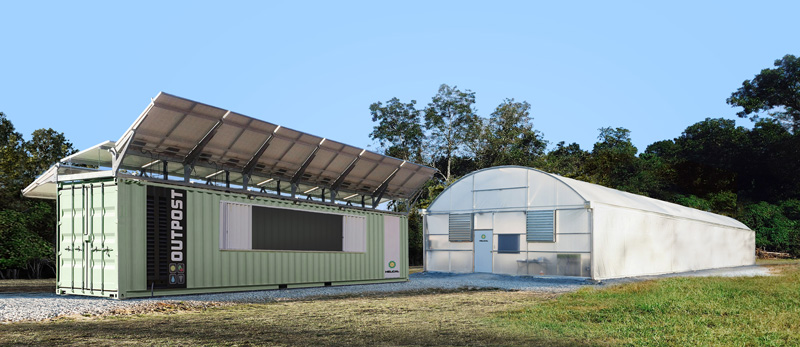
Helical Outpost showing solar panels
The son of the late Dan Frantzen, a co-founder of Stone Energy, Kohlie is an attorney who grew up believing he could chase his dreams just as successfully as his dad did as a wildcatter in the oil and gas industry. Kohlie has transitioned into the agriculture world and is now a proponent of the many benefits of hydroponic farming.
Kohlie co-founded Helical Holding with Dylan Ratigan, a former MSNBC host. He was initially drawn to the concept of hydroponic farming as a way to assist returning veterans in finding sustainable employment, or as he stated, “to give them a vocational path rather than a benefits path. However, his wife’s family are farmers in Crowley and he was extremely skeptical of the claims made about hydroponic farming. In order to understand the concept of farming without soil, he attended a six-week course in Southern California which taught him a lot about the technical end of hydroponics, but not much in the way of practical knowledge as to how to sustain the practice as a successful business model.
Kohlie decided to use his oil and gas background and apply it to hydroponics. Utilizing standard operating practices in a similar manner to the oil and gas mentality of “quickly setting up, do what you have to do, and then pack up and move on to the next job,” hydroponics gives farmers great flexibility in where their “farm” is set up and keeps costs down as compared to conventional farming which demands vast acreage and resources.
The advantages of hydroponic farming are many. First of all, the weather is not an issue as the pod protects the plantings from the elements and can be moved when threats such as hurricanes or floods are on the horizon. The plants grow faster as they receive nutrients 24 hours a day, 7 days a week through recirculated water. Vegetables grow about 25 percent faster and produce 30 percent more in hydroponic systems Hydroponic farming systems use 90 percent less water, 90 percent less land, and produce the equivalent of as much as 3 acres of organic farm soil in as little as 5,000 square feet. It also has satellite internet access and a water filtration system. Each pod is a power station, communication hub, and a water purifier all in one.
Interestingly, hydroponics has actually been around for thousands of years. Many of us are familiar with the Hanging Gardens of Babylon, one of the seven wonders of the world. Built along the Euphrates River around 600 B. C., the gardens were watered using a chain pull system. Later in the 10th and 11th Centuries, the Aztecs utilized hydroponics on Lake Tenochtitlan, and similar floating gardens are in use today in Myanmar.
Hydroponic farming has great potential to provide healthy produce to food deserts in neighborhoods without easy access to food, especially fresh produce. One of Helical’s earliest clients was St. Joseph’s Diner in Lafayette, which serves people affected by poverty and homelessness.
One goal Kohlie has is to encourage a new generation of farmers. He pointed out that the average age of farmers in the U. S. is 60 and rising, and the industry suffers from a high suicide rate. It can be a brutal career path and not many people are entering the field. The concern is that once this generation of farmers ages out, who will be there in twenty years to take their place? Working with the late Scott Kornberg of American Hydroponics, Kohlie realized that to appeal to the next generation of young people, you have to sell farming to them on their own terms, and make it as “sexy” as Snapchat.
A hydroponic garden was installed at John Paul the Great Academy and has been operating for three years. Now, in addition to teaching science, math and theology, instructor Craig Baker is also “head farmer” shepherding his crew of young pupils. Baker and his students harvest about 500 heads of lettuce and 50 pounds of tomatoes a week from their 40-by-35-foot garden, which was donated by Helical Outposts in Lafayette. The students enjoy the process, great quantities of produce are grown, and a new generation of farmers may be in the making.
The produce grown hydroponically at John Paul the Great Academy is used for school lunches and by the Carmelite monastery next door, donated to St. Joseph’s Diner, and sold at the local farmer’s market. Local restaurants who source the produce include Cafe Josephine, Social, Saint Street Inn, Blue Dog Cafe, Cafe Vermilionville, Pamplona and Bread & Circus.
One group of young people that Kohlie would love to see engage in hydroponic farming are inner-city youth who may not have access to the resources of children with more family assistance and resources. His days spent as a prosecutor in Jefferson Parish taught him firsthand that the juvenile drug dealers he was prosecuting had so much potential, they just didn’t have a shot because of their circumstances. They were bright, able to calculate grams to ounces, market their goods, understand the time value of money, but they just didn’t have a legal product. He would like to shift this dynamic and create a better alternative to produce great value in their communities. Bringing fresh produce and jobs to these communities would provide great value.
At a recent community event Kohlie attended in the Mc-Comb Veazey neighborhood, people were asked what their number one priority would be if money was not an issue. The overwhelming majority said that access to fresh produce was their biggest desire. (Money for their mortgages was number two). There is definitely a market and desire for the goods that hydroponic farming can deliver and Kohlie is set on bringing this to fruition through Helical Outposts.
Kohlie Frantzen wears all the hats at Helical Outposts, including serving as delivery driver of produce to restaurants. His heart and mind are set on making hydroponic farming more mainstream, and he is definitely on the right path. Discover Lafayette thanks Kohlie for the time he took with us to introduce this concept of sustainable farming to our community.
For more information on Helical Outposts, visit http://helicalholdings.com/about/our-story
